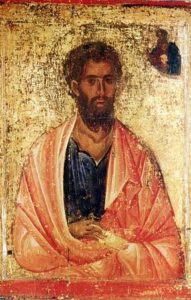Listen to the reflection on James 1:9-12, "Pride vs. Humility" (14 mins):
The man James
-
- In the NT, James is by far the most significant (half-)brother of Jesus (Matthew 13:55, Mark 6:3, Acts 1:14).
- Notice: “servant of God and of the Lord Jesus Christ" (1:1)—similar humility in Jude, also penned by a brother of Christ. His is a humble stance
- James’ conversion
- We see early in the gospel of Mark that Mary and her sons did not appreciate Jesus’ identity and mission (Mark 3:20-21, 31). They would not (or could not) go into the meeting; instead they sent a messenger to fetch Jesus, whom they think has gone over the top!
 James and the other brothers are Jesus’ would-be advisers in John 7:1-5. They seem skeptical about their older brother.
James and the other brothers are Jesus’ would-be advisers in John 7:1-5. They seem skeptical about their older brother.- But after Jesus' death, his brothers join the apostles in prayer (Acts 1:14).
- By Acts 15 James is a significant leader in Jerusalem.
- Note: he is not the apostle James, son of Zebedee (Acts 12:2). He did, however, become a major voice in the Jerusalem church, eclipsing Peter, probably due to Peter’s responsibilities outside Jerusalem (see Acts 12:17; 15:13; 21:18; Galatians 1:19; 2:9, 12), and left us with the epistle of James (James 1:1).
- Galatians 1:19 possibly indicates he was recognized as an apostle.
- According to Josephus, the Jewish historian, James was stoned to death by the Jews in 62 AD. “Festus was now dead, and Albinus was on the road; so he assembled the Sanhedrin of judges, and brought them the brother of Jesus who was called Christ, whose name was James, and some others. And when he had formed an accusation against them as breakers of the law, he delivered them to be stoned: but as for those who seemed the most equitable of the citizens, and such as were the most uneasy at the breach of the laws, they disliked what was done; they also sent to the King [Agrippa] desiring him to send to Ananus that he should act so no more…"
.
James 1:9-12
- James puts the material world in perspective. Poor people can please God, and so can rich people (see 1 Timothy 6), but both need to watch their step.
- Hillel (c. 20 BC) wrote "My humiliation is my exaltation, my exaltation is my humiliation."
- The scorching wind may well be the scirocco ("a hot wind, often dusty or rainy, blowing from North Africa across the Mediterranean to southern Europe).
- If we keep our head and our faith, and keep away from the perils of materialism, we will one day receive the “crown of life.”
- This crown is received neither quickly nor cheaply. The price is high, the reward infinite.
- We can persevere under trial, or we can frown and get a bad attitude. Yet we should never blame God. He is always fair. This ties in to 1:13-15—our next reflection.
- If I'm more dependent on rationalizations for why I don't push myself—why I don't persevere—than I am on God, I will always manage to find a reason why I can't persevere. But if I love him and am convinced God loves me (v.12), through his grace I will move through trial after trial—and even count them as pure joy (1:2).
The next reflection, from James 1:13-15, is "Victors, not Victims"








